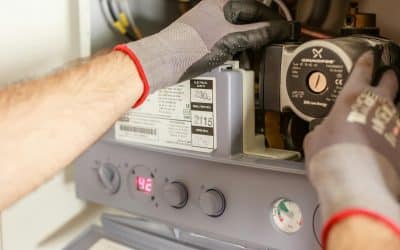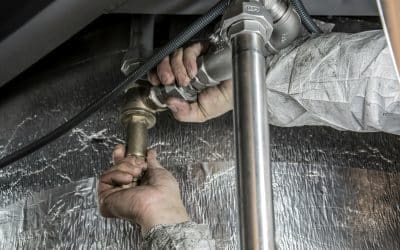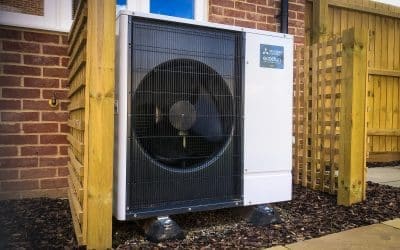An air source heat pump (ASHP) is one of the most energy-efficient ways to heat your property all year round!
However, with the weather starting to get colder, there are some things that you need to consider to maintain the efficiency of your air source heat pump.
That said, our experts, at JL Philips, have put together a handy guide to help you make sure your renewable heating system is working as it should, even in colder temperatures.
How Do Air Source Heat Pumps Function?
An ASHP is equipped with a fan that helps the heating system bring in outside air, which is then passed over an exchanger coil containing a refrigerant fluid. This fluid boils and gradually turns into vapour which is further compressed at a higher temperature to produce heat for your home.
Simply put, an air source heat pump extracts heat from the outside air and uses it to heat your property, even during cold weather.
Additionally, heating your home with an ASHP offers multiple advantages like:
- Excellent Performance, Even at Sub 0 Temperatures
- Minimal Maintenance
- Lower Energy Bills
- A Lifespan of Nearly 25 Years (if maintained properly)
- Substantial Savings Under the RHI Scheme
While it has the potential to function all year round, additional care may be required to maintain the efficiency of your air source heat pump during the colder months.
To find out whether an air source heat pump is ideal for your property, click here!
How to Use My Air Source Heat Pump in Colder Temperatures?
Although ASHPs are known to perform at their best when the weather is pleasant and warm, they can still generate substantial amounts of heat for your home in colder weather.
To maintain the efficiency of your air source heat pump, you should take the following tips in stride:
-
Do Not Cover Your Heat Pump
As it starts getting cold outside, you might be tempted to cover your heat pump in order to prevent it from freezing. However, this is something you should refrain from doing since it can block the airflow, leading to mould build-up and ultimately, reducing your heating system’s overall efficiency. Instead, why not try using the defrost mode to keep your ASHP from freezing? If you need help with this, be sure to speak to our team!
-
Install a Smart Thermostat
Installing a smart thermostat with your air source heat pump can be a valuable addition to your central heating system. This is because it can regulate the temperature of your home based on the predefined input criteria, and you can even monitor it from your phone!
A thermostat can offer better control over your heating system while helping you lower your energy bills.
If you’re not sure how to choose the perfect thermostat for your air or ground source heat pump, you can seek assistance from the professional installers at JL Philips.
-
Clear Leaves and Other Debris
If the space around your ASHP is full of leaves and other debris, it can potentially block your heating system’s airflow and result in reduced efficiency. This is why it’s vital for you to ensure that the area surrounding your heat pump is cleaned as often as possible, even if that means giving it a quick look over once a week.
-
Ensure Your Property is Well-Insulated
Your heat pump might be generating substantial heat for your home, but you could be losing as much as 35% of it if your property isn’t insulated. Moreover, air leakage is another issue that you may face due to uninsulated walls.
By insulating your property, you can prevent the transfer of heat energy while decreasing your energy bills.
With the government’s newly launched Green Homes Grant Scheme you could be eligible to save up to ⅔ of the cost of upgrading your insulation.
-
Consider Installing Large Radiators
You may already have radiators installed in your home and while they can be integrated with your heating system, there’s a good chance that they might be too small for your heat pump.
In this case, you could either add more radiators or consider installing a larger one so that the heat pump can work efficiently. Remember, as long as your radiator is right-sized, you can rest assured that your heating system is producing the right amount of heat.
Additionally, seek assistance from a professional heating engineer for proper guidance through the entire process.
-
Get Your Heat Pump Serviced Before Winter
Although heat pumps can function at an efficient rate of nearly 300%, it’s still better to get it serviced by an expert before winter. This will ensure that its efficiency is maintained throughout the cold weather.
To schedule a service & maintenance appointment, contact our professional heat pump installers today!
Contact JL Philips for Air Source Heat Pump Installation
If you want to make your home more eco-friendly and energy-efficient, then ASHPs are the perfect solution.
They’re not only a source of green energy but also an excellent way to save money on your energy bills. What’s more, the installation of an air source heat pump can also be covered under the Green Homes Grant Scheme meaning you can offset the costs of an otherwise expensive home improvement project.
To find out more about this heating system, get in touch with JL Philps today!





